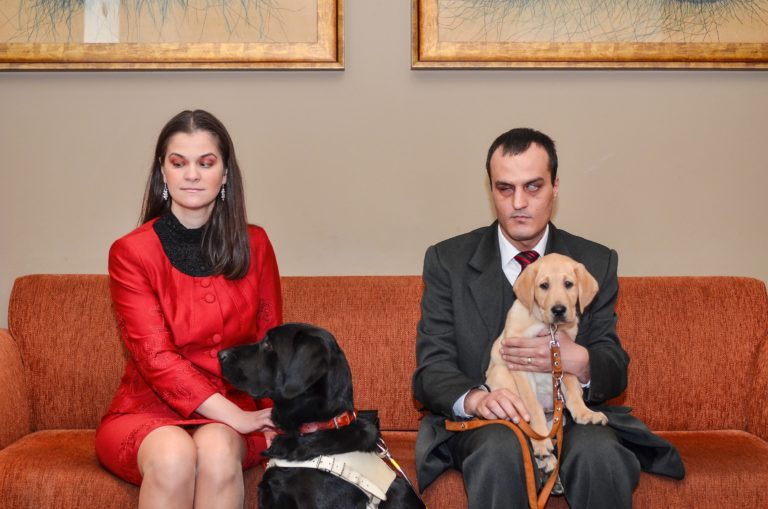Adrian and Veronica are in their early 30s and have been married since 2010. They work as masseurs at the “Ghicelui” Arad Therapy and Rehabilitation Center for children and are qualified social workers. They have both suffered from absolute blindness since birth.
“For us, the idea for a guide dog was an unfulfilled dream”, says Adrian. “It seemed unattainable in Romania.”
In the summer of 2014 they met Max, an Irish guide dog, in Bucharest.
“Something virtually impossible to explain was sparked then,” says Adrian. “We realized then that as a visually impaired couple we could achieve independence with a guide dog.”
It’s not always easy for blind people to depend on a third, sighted person to help them. The connection between Adrian and Veronica and Max was quickly established and it was love a first “sight”.
They had to wait until September for Max to come to Arad. It seemed like an eternity. They felt honoured to be trained with Mr. Alan Brooks from the UK, as well as Anca Vasile from the charity.
“After only 10 days we acquired the spatial mobility we always longed for,” says Adrian. “Our love for puppies already existed and our desire to learn was intense.”

Their partnership with Max was the first tandem partnership in Romania, if not Eastern Europe. Now they could go by themselves, with Max, to work and back and do trivial things like going shopping without depending on someone else.
“The most significant thing,” says Adrian, “was the idea that as a couple we could take a walk together. I don’t have words to explain how it felt to go together as a couple, with Max’s help, for a romantic walk or dinner.” Now, with the help of their intelligent friend Max, they can go wherever they need to go.
“Veronica can go and meet her friends,” says Adrian, “and I can go out with the boys.”
They advise any blind person who wants independence to consider getting a guide dog, even though it involves a lot of responsibility.
“The guide dog has needs and is a being who depends on the blind,” explains Adrian.
“He needs love, petting, play and to be taken care of. He has to be walked regardless of the rain, snow and heat and has physiological needs. A healthy and happy dog makes a happy life for the blind.”
Adrian explains that blind people also need mobility and orientation in order to be compatible with a guide dog and it is also important to keep up all the skills given by the guide dog trainer.
“Otherwise the dog may lose some of the skills,” says Adrian, “and you will have achieved nothing.”
Adrian and Veronica feel the government should develop appropriate legislation for people with disabilities. The local community should comply with the accessibility legislation in public places in order to make the blind person’s life easier. A well-developed media campaign would help educate the public and make them more aware of the importance of guide dogs for the blind.
